Is Remote Work Here To Stay Forever? 2024 Overview

Less than three years ago, when the pandemic started to set down, we wrote several articles about remote work and its post-pandemic effects in the tech industry. One of the main problems in 2021 was when tech companies will reopen their offices.
Now, in 2024, with this problem partially solved, and major layoffs in large tech companies such as Meta, X, and Google among others, we are on the brink of a new remote-tech era. Or, maybe the last one never ended.
Aside from big tech companies, there are smaller tech enterprises - IT companies with a small to medium level of employees that have adopted remote work as a workstyle due to a wide variety of reasons, factors, and this, in its turn reshaped the global tech landscape.
Therefore, we decided to survey 756 professionals across the world, working for different tech companies, and see what’s the current state of remote work in 2024.
Key Takeaways:
-
46.1% of tech companies adopted full remote work
-
Employee preferences are the main reason why tech companies decided to work remotely
-
32.6% of tech companies consider that their employees are significantly more productive at home
-
86.5% of tech companies provide video conferencing tools for their remote workers
-
43.8% of tech companies have ad-hoc policies regarding remote work
-
52.8% of employees are still facing communication problems within the framework of remote work
-
Task/project milestones are the main KPIs in remote work productivity measurement in the tech industry
-
31.4% of tech companies declared that they had significant savings due to remote work
-
29.2% of tech companies are providing remote work training for their employees
-
59.6% of tech companies say that it’s very likely to continue remote work in the future
-
Free apps and tools like Google Meet and Gmail are mostly what tech companies rely in connecting with their remote workers
Survey Respondents Demographic Profile
Between April 30 - May 15th, 2024, TechBehemoths conducted a survey among 756 professionals across 26 countries to identify the current state of remote work in 2024. Every respondent represents 1 company, therefore, 756 professionals are equal to 756 surveyed companies in this quantitative research.
At the same time, most of the respondents are representing the following positions in their company:
-
Founders and CEOs constitute 20.7% of the respondents, the second-largest group.
-
Project managers account for 15.5% of the survey participants
-
UI/UX designers make up 12.6% of the respondents
-
Marketing managers represent 9.8% of the survey respondents
-
Mobile and web developers constitute 9.2% of the respondents
-
SEO managers form the smallest distinct group, accounting for 6.3% of the respondents.
As we aimed to target in our survey a border variety of professionals and measure the impact of remote work in as many tech fields as possible, the category labeled "Others" comprises 25.9% of the respondents
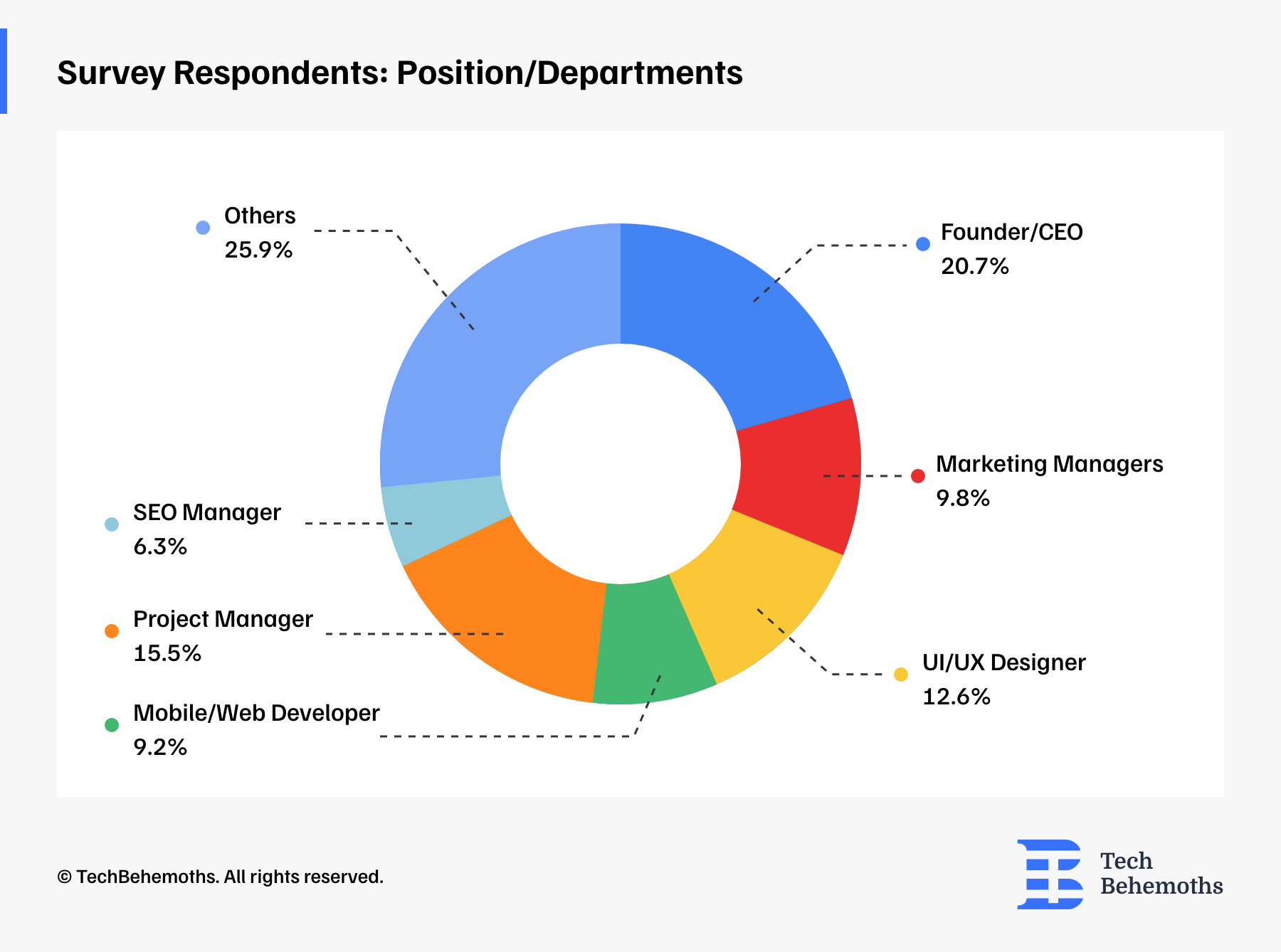
Remote Work Frequency in Tech Industry
The survey question regarding remote work frequency in tech companies for 2024 revealed the following distribution among respondents: 46.1% of employees work remotely full-time, making it the largest category. This is followed by 27.0% who work remotely several days a week, and 23.6% who work remotely occasionally. Only 3.4% of respondents indicated that their employees never work remotely.
The findings below reveal a strong embrace of remote work practices within tech companies, with almost half of the workforce engaged in full-time remote work. Additionally, a substantial number of employees work remotely for several days a week or occasionally, indicating a broad acceptance and seamless integration of flexible work arrangements in the industry.
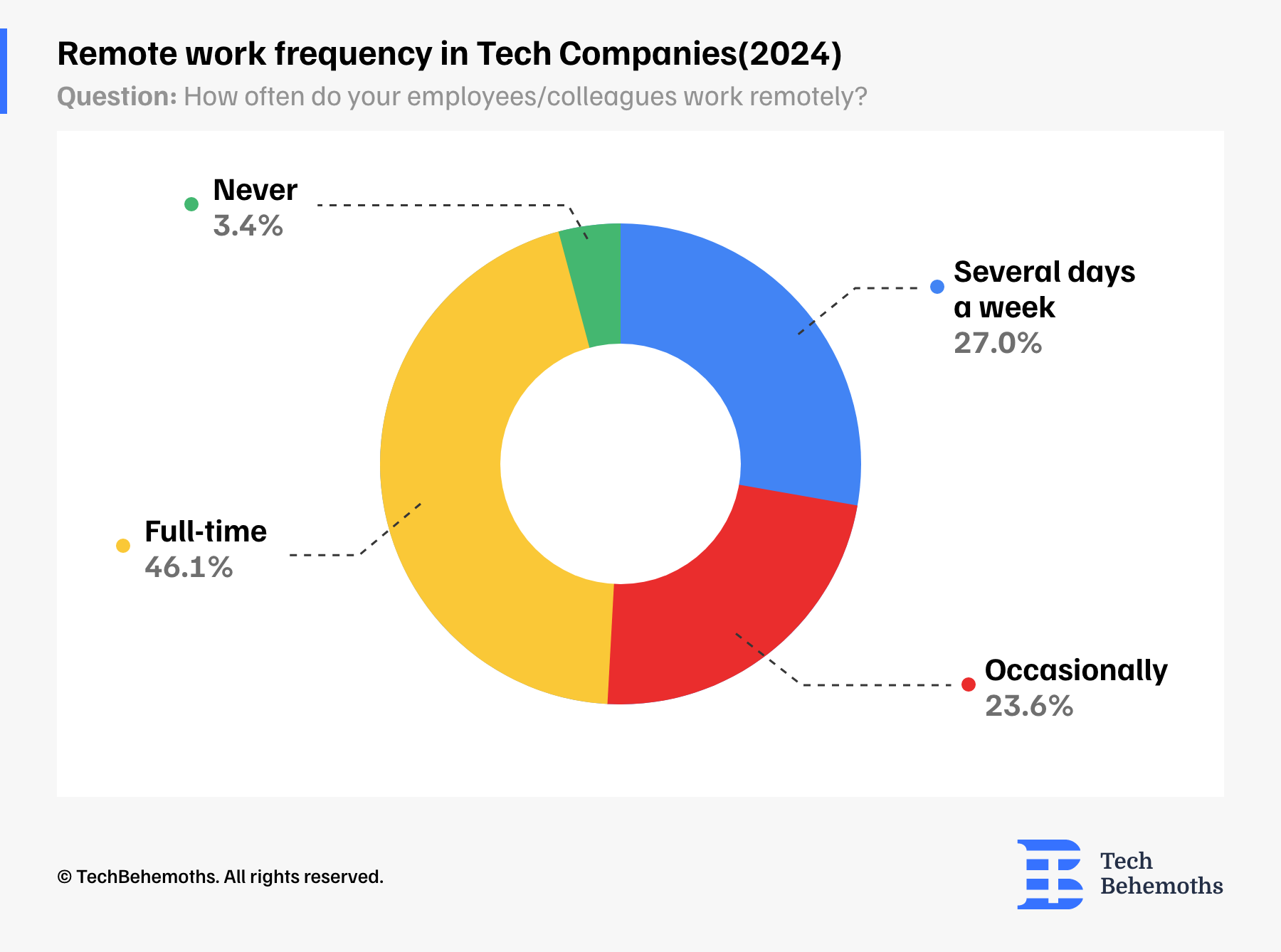
Share of employees working remotely in Tech Companies
The survey question addressing the share of employees in tech companies working remotely provides a detailed breakdown of current remote work trends. The data indicates that 39.8% of companies have between 76-100% of their workforce working remotely, making it the largest segment. Following this, 26.5% of companies report that 1-25% of their employees work remotely. Meanwhile, 18.1% of companies have 51-75% of their workforce engaged in remote work, and 15.7% indicate that 26-50% of their employees are working remotely.
These figures highlight a substantial inclination towards remote work within the tech industry, with a significant portion of companies operating with a predominantly remote workforce.
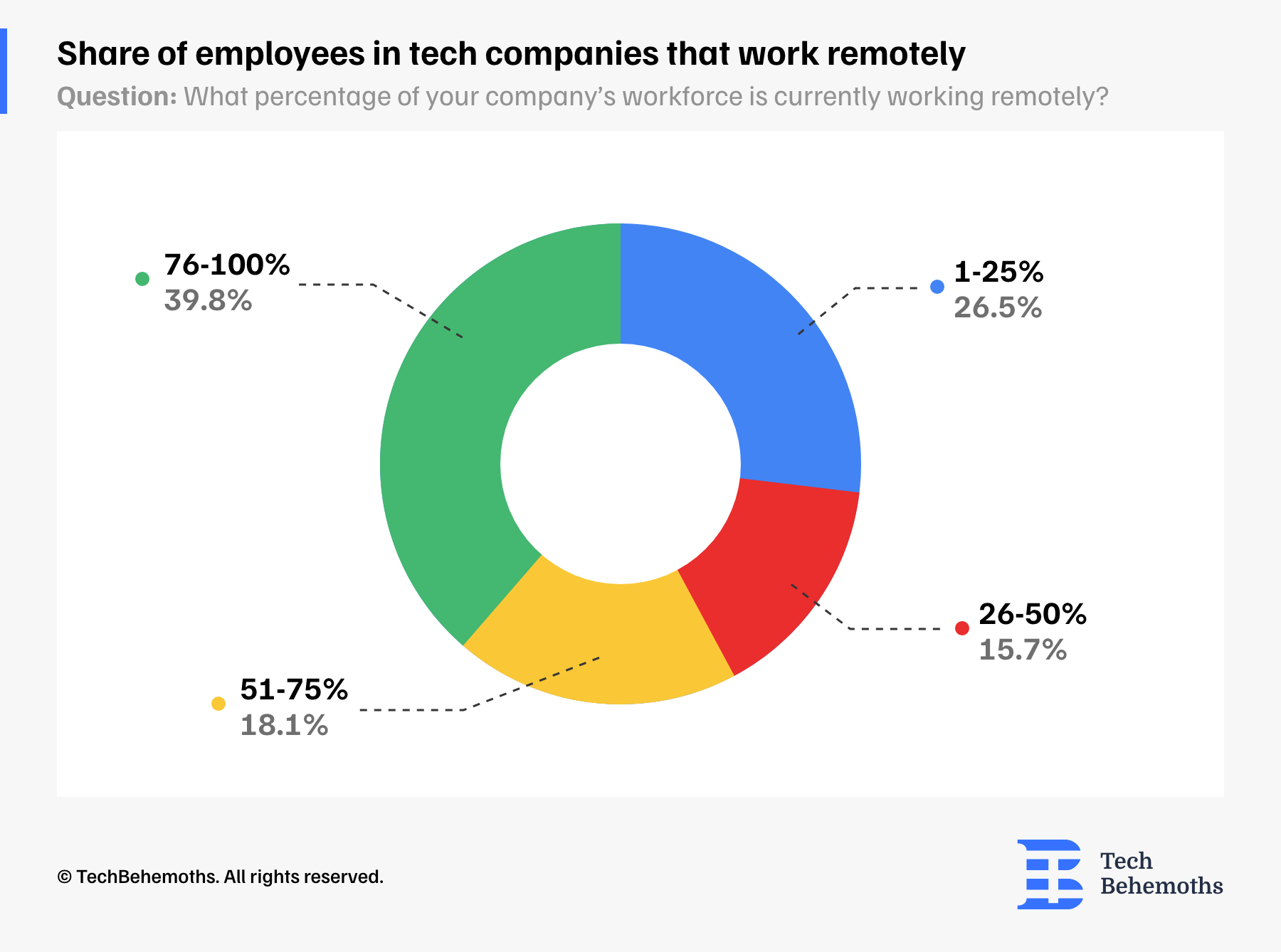
Main reasons behind remote work for tech Companies
The survey question explored the primary motivations driving tech companies to implement or continue remote work practices. The results reveal that the predominant factor is employee preference, cited by a commanding 73% of respondents. This is followed by better access to talent, a reason given by 57% of the companies, highlighting the ability to attract skilled professionals regardless of geographic location. Cost savings is another significant driver, with 52% of respondents acknowledging this benefit of remote work. Increased productivity also plays a crucial role, motivating 46% of companies to adopt remote work models. Lastly, 17% of respondents selected other reasons, indicating a variety of additional factors influencing their decision to embrace remote work.
Emphasizing employee preferences demonstrates a dedication to meeting the needs of the workforce, which can lead to increased job satisfaction and employee retention. At the same time, embracing remote work allows access to a wider pool of talent and can result in cost savings, reaffirming the strategic move towards remote work. Improved productivity metrics also support remote work as a feasible and advantageous operational model in the tech industry.
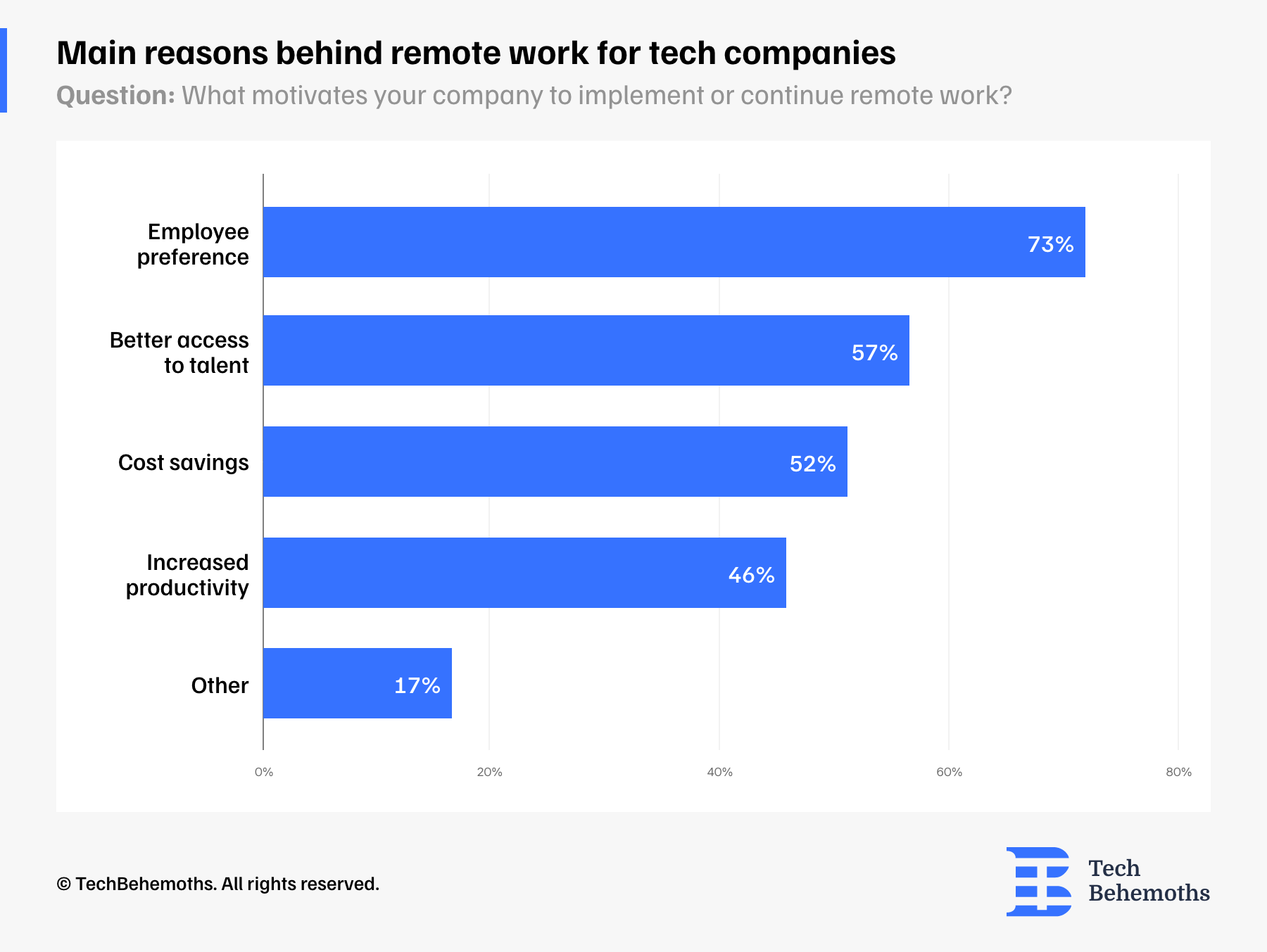
Impact of remote work on employee productivity
The survey results show that 32.6% of companies reported a significant increase in productivity due to remote work, while 21.3% observed a somewhat increased productivity. These figures collectively indicate that over half of the respondents (53.9%) experienced enhanced productivity, underscoring the effectiveness of remote work in driving performance improvements.
Conversely, 33.7% of respondents noted no change in productivity, suggesting that for a substantial portion of the workforce, remote work neither positively nor negatively impacted their output. Meanwhile, a smaller segment of companies reported a decrease in productivity, with 10.1% indicating a somewhat decreased productivity and only 2.2% experiencing a significant decline.
The widespread adoption of remote work models has had a positive impact on productivity for many companies, confirming that they are experiencing tangible benefits from these arrangements. However, the data also shows that the impact of remote work varies, as it can significantly boost productivity for some while having neutral or even negative effects for others.
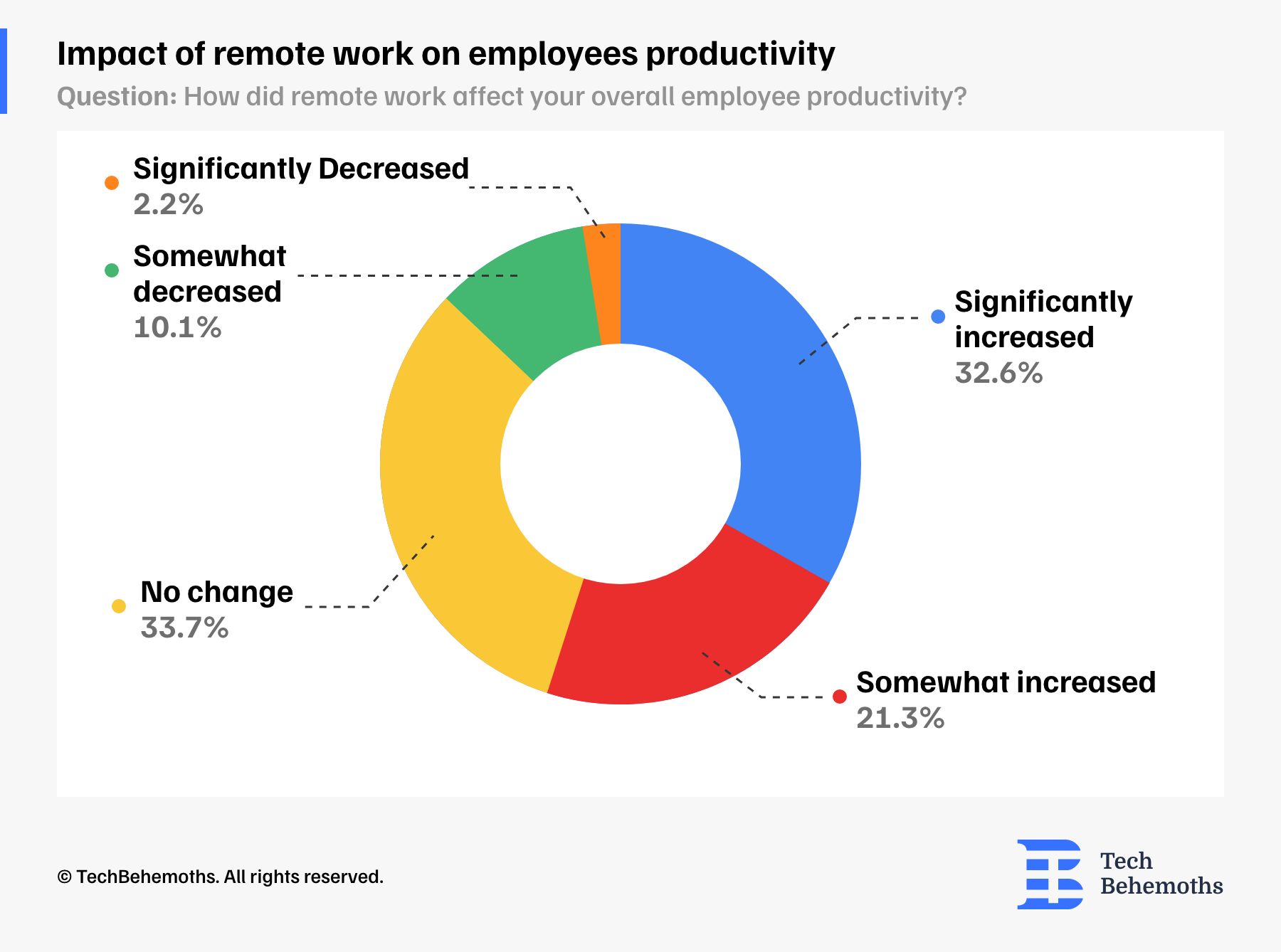
Types of digital tools offered by tech companies to their remote workers
The survey question regarding the types of digital tools offered by tech companies to support remote work reveals a comprehensive array of technological solutions. A significant 86.5% of companies provide video conferencing tools, making it the most prevalent digital resource. This is followed by project management software, utilized by 79.8% of respondents, indicating a strong emphasis on coordinating and tracking project progress remotely. Collaboration platforms are also widely used, with 68.5% of companies offering these tools to facilitate teamwork and communication.
Time-tracking software is provided by 48.3% of companies, highlighting the importance of monitoring work hours and productivity in remote settings. Productivity software is available in 37.1% of the surveyed companies, aimed at enhancing individual and team efficiency. Additionally, 24.7% of companies offer VPN access, ensuring secure remote connectivity and data protection. Lastly, 14.3% of respondents indicated the provision of other digital tools, reflecting a diverse range of additional resources tailored to specific organizational needs.
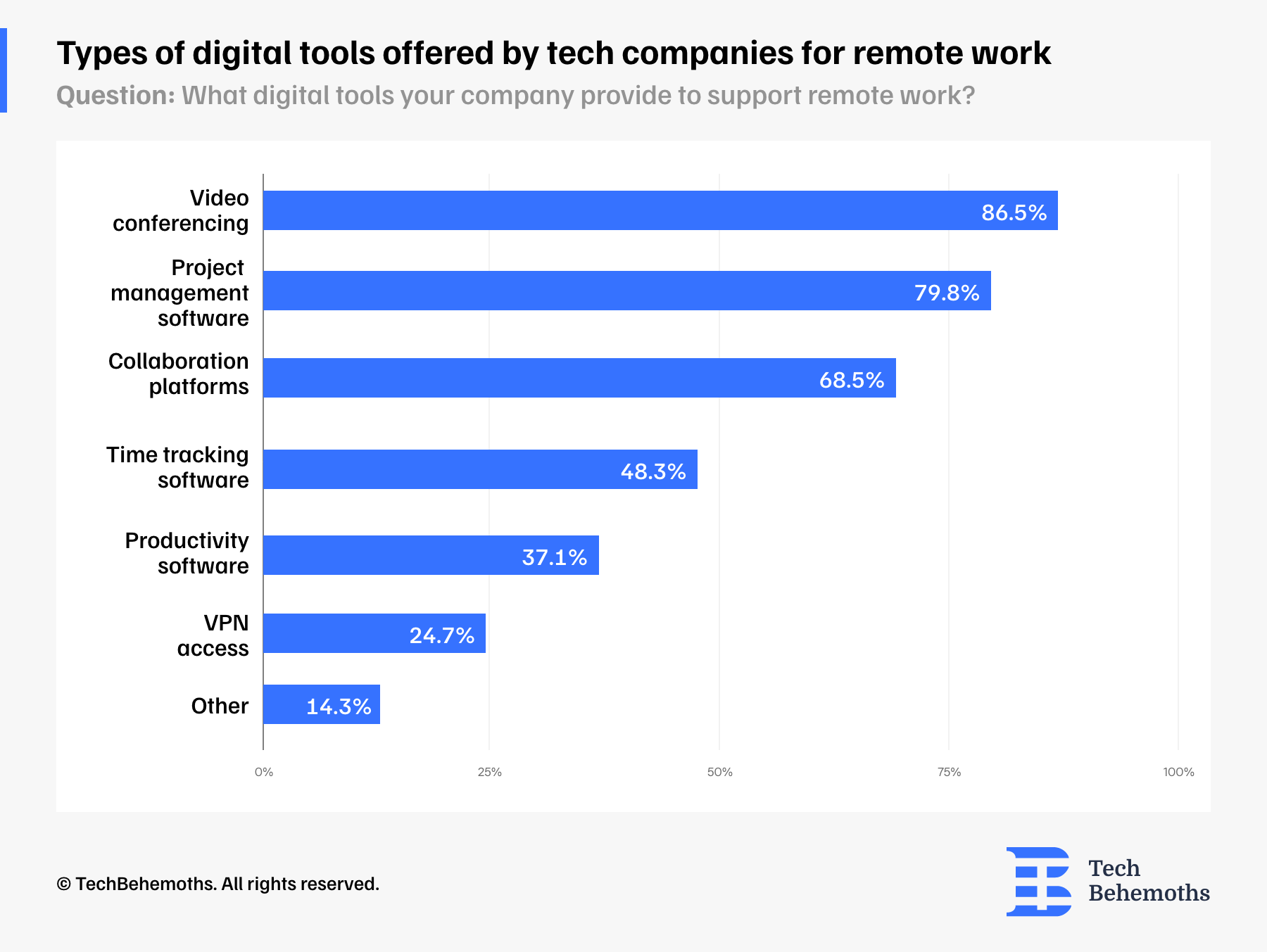
Most common apps used in remote work by tech employees
The survey question on the most common apps used in remote work by tech employees provides a clear picture of the digital tools facilitating remote operations, and more precisely, here is the outcome:
Leading the list is Google Meet, utilized by 66.3% of respondents, highlighting its widespread adoption for virtual meetings and video conferencing. Gmail follows closely at 56.2%, reflecting its importance as a primary communication tool.
Zoom is another significant player, used by 47.2% of companies, underscoring its popularity for virtual meetings and webinars. Slack is employed by 43.8% of respondents, indicating its crucial role in team communication and collaboration.
Jira is used by 33.7% of companies, showcasing its relevance for project management and issue tracking, particularly in development and IT teams. Microsoft Teams, used by 32.6% of respondents, combines communication and collaboration features, making it a versatile tool for remote work.
Trello, employed by 27% of respondents, is a popular choice for task management and project organization, while Asana is used by 14.6%, reflecting its role in project tracking and team coordination. The "Other" category, accounting for 32.3%, indicates a variety of additional tools tailored to specific organizational needs and workflows.
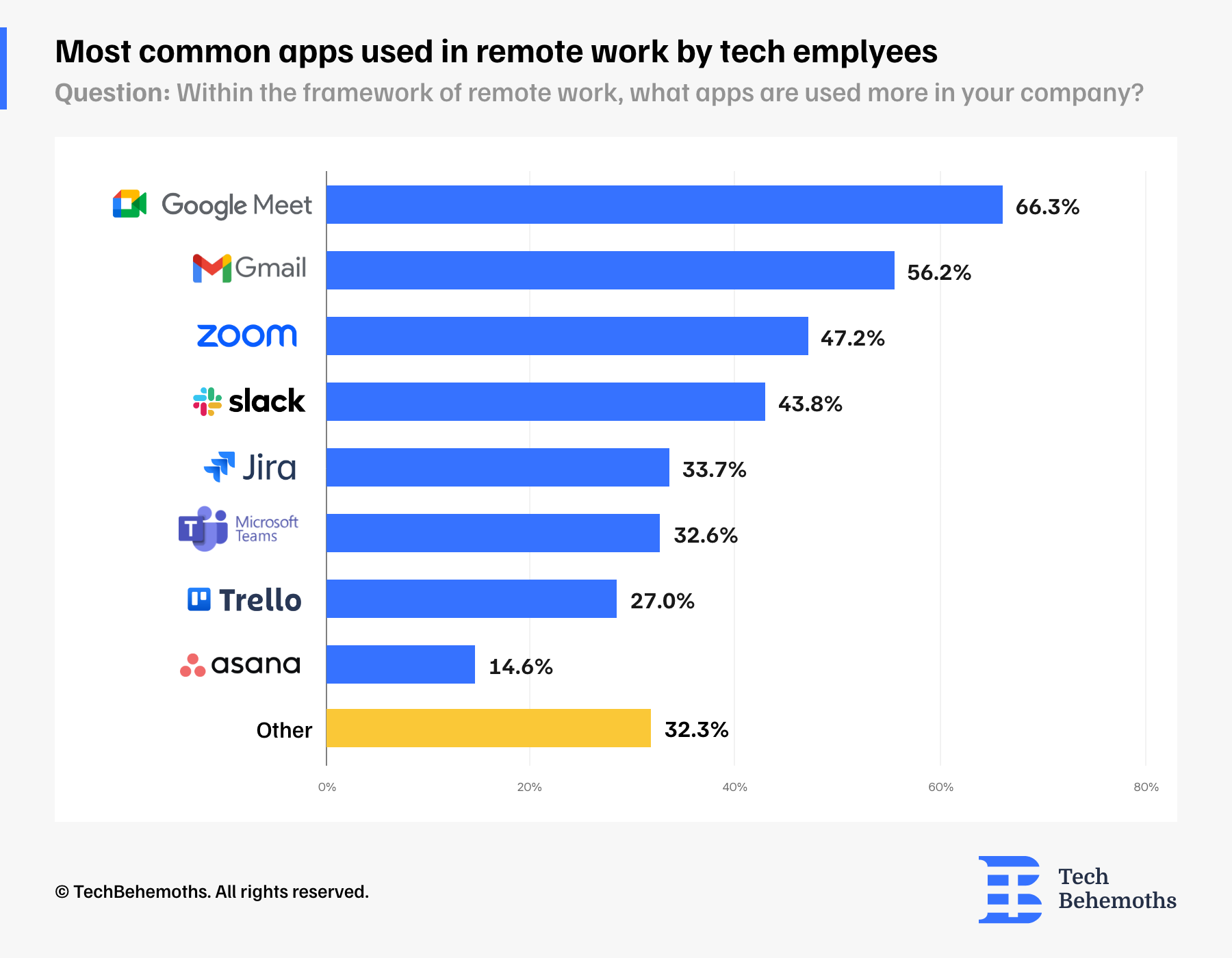
Incentives for remote work in tech companies
The most common incentive, cited by 41.1% of respondents, is the provision of gear for home offices. This includes items such as ergonomic furniture, monitors, and other equipment necessary to create a conducive work environment at home.
Software solutions are offered by 39.7% of companies, reflecting the importance of providing the necessary digital tools and applications to facilitate remote work. These solutions likely include productivity software, communication platforms, and project management tools. Courses and training opportunities are provided by 30.1% of companies, indicating a commitment to continuous learning and professional development. This support helps employees adapt to remote work tools and practices, enhancing their skills and productivity.
More time off is offered by 27.4% of companies, and longer breaks by 24.7%, highlighting a focus on employee well-being and work-life balance. These incentives aim to reduce burnout and maintain employee morale.
Covering internet expenses is an incentive provided by 16.5% of companies, acknowledging the essential nature of reliable internet connectivity for remote work. This support helps mitigate one of the key logistical challenges of working from home. Additionally, 14.3% of respondents indicated other incentives, suggesting a variety of additional benefits tailored to specific company needs and employee preferences.
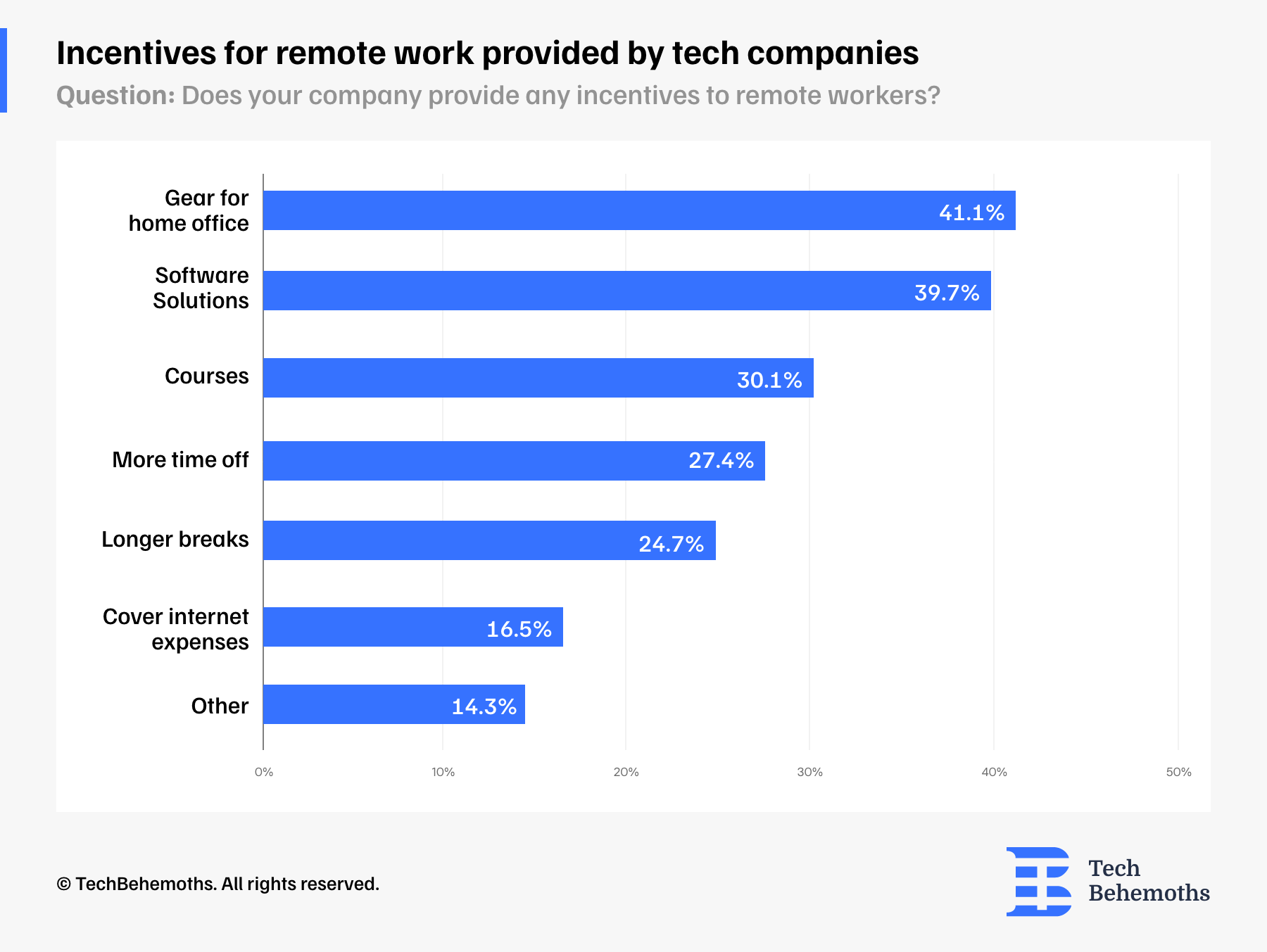
Remote work rules and policies in tech companies
The survey inquiry on remote work regulations and policies in the tech industry illuminates the diverse approaches to managing remote work. According to the data, 43.8% of tech companies have implemented flexible or ad-hoc remote work policies, indicating an adaptable approach that can be tailored to individual needs and circumstances. Additionally, 28.1% of respondents reported having comprehensive remote work policies in place, reflecting a structured and formalized approach to managing remote work practices.
Also, 25.8% of companies operate without formal remote work policies, suggesting a more informal or possibly emergent approach to remote work arrangements. This may imply a reliance on trust and individual agreements rather than standardized guidelines. In the end, a small fraction (2.2%) of companies are currently developing remote work policies, signaling ongoing efforts to establish formal guidelines as remote work continues to evolve.
The prevalence of flexible and ad-hoc policies suggests that many companies prioritize adaptability and responsiveness to dynamic work environments. The presence of comprehensive policies in a significant portion of companies underscores a commitment to structured remote work frameworks, ensuring consistency and clarity in remote work practices. In contrast, the absence of formal policies in a quarter of the companies may indicate a reliance on more organic or individually negotiated arrangements
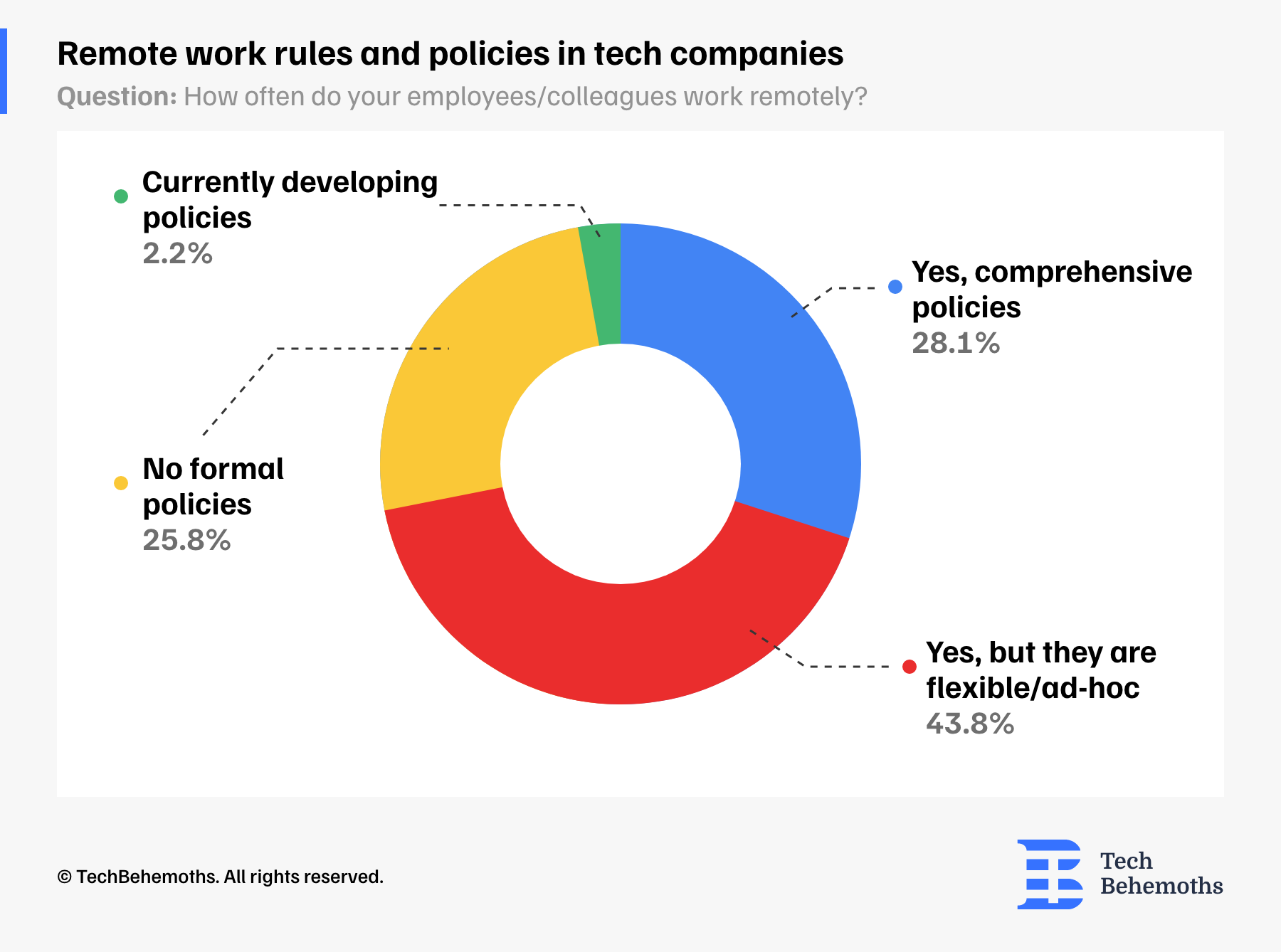
Remote work Employee’s challenges
The survey question on the main challenges employees face while working remotely reveals several key issues impacting the remote work experience. Communication stands out as the most significant challenge, with 52.8% of respondents identifying it as a major hurdle. This underscores the difficulty in maintaining clear and effective communication channels in a remote setting, which is crucial for collaboration and productivity.
Staying motivated and maintaining work-life balance are equally cited by 33.7% of respondents. These challenges reflect the difficulty in sustaining engagement and separating work from personal life when working remotely, which can affect overall well-being and job performance. Technical issues are another notable challenge, reported by 31.5% of respondents, highlighting the reliance on technology for remote work and the problems that can arise from technical failures or limitations.
Additionally, 18.1% of respondents mentioned other challenges, indicating a variety of less common but still significant issues that employees face in remote work environments.
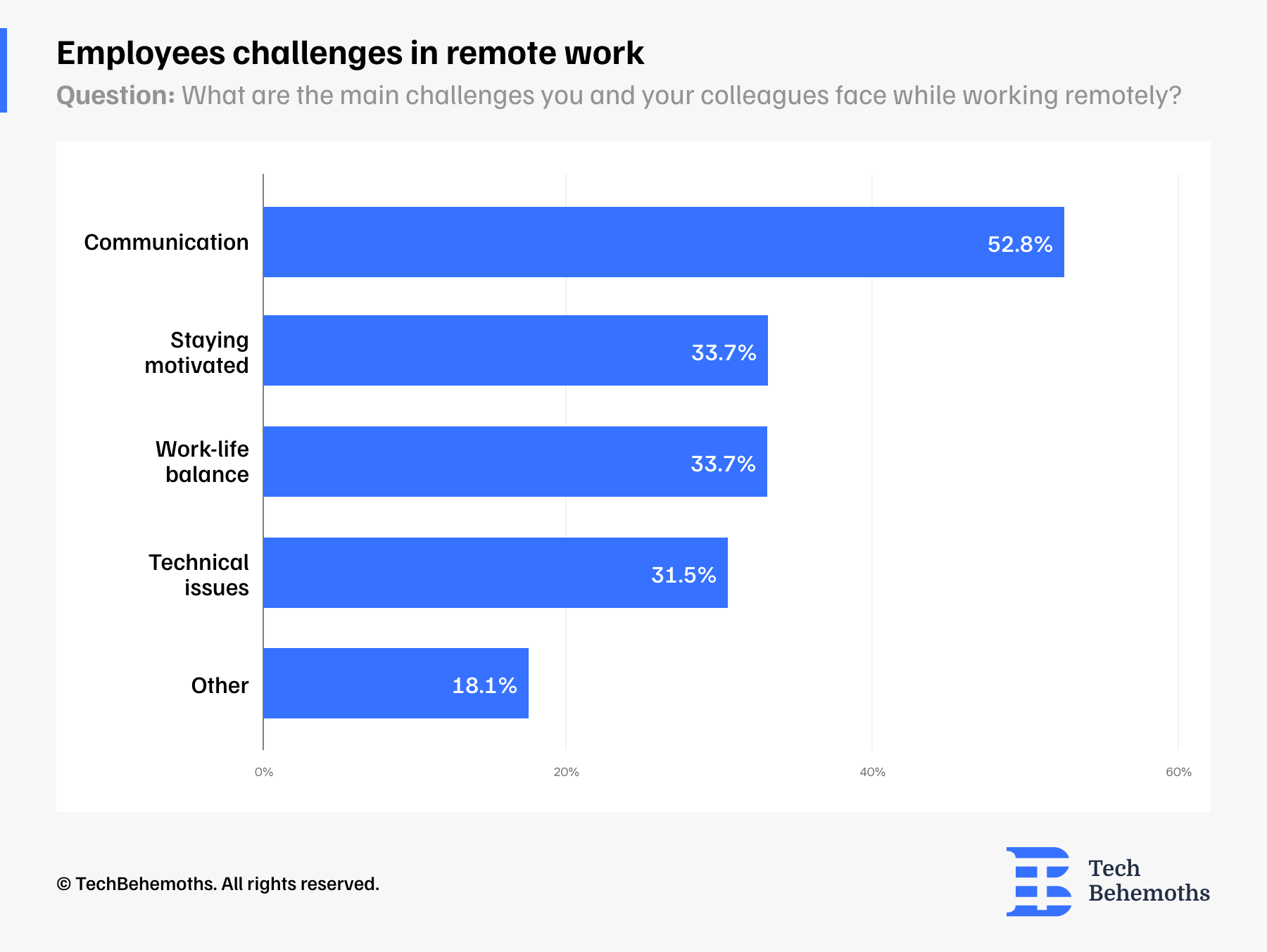
How tech companies measure productivity for remote workers
The survey revealed that tech companies primarily rely on output-based metrics to measure productivity for remote employees.A significant 60.9% of companies measure productivity through completed tasks and projects, emphasizing an outcomes-focused approach to assessing remote work performance. This method underscores the importance of deliverables and tangible results in evaluating employee contributions.
Regular check-ins and updates are utilized by 17.2% of companies, indicating a process-oriented approach that involves frequent communication and status reporting. This method helps maintain accountability and ensures that employees stay aligned with their goals and deadlines.
Time tracking is employed by 9.2% of the companies, reflecting a more traditional approach to productivity measurement based on hours worked. While less common, this method provides a quantifiable metric of employee activity and time management.
The "Other" category, accounting for 12.6% of responses, suggests a variety of additional methods being used to gauge productivity, potentially including qualitative assessments, peer reviews, or client feedback.
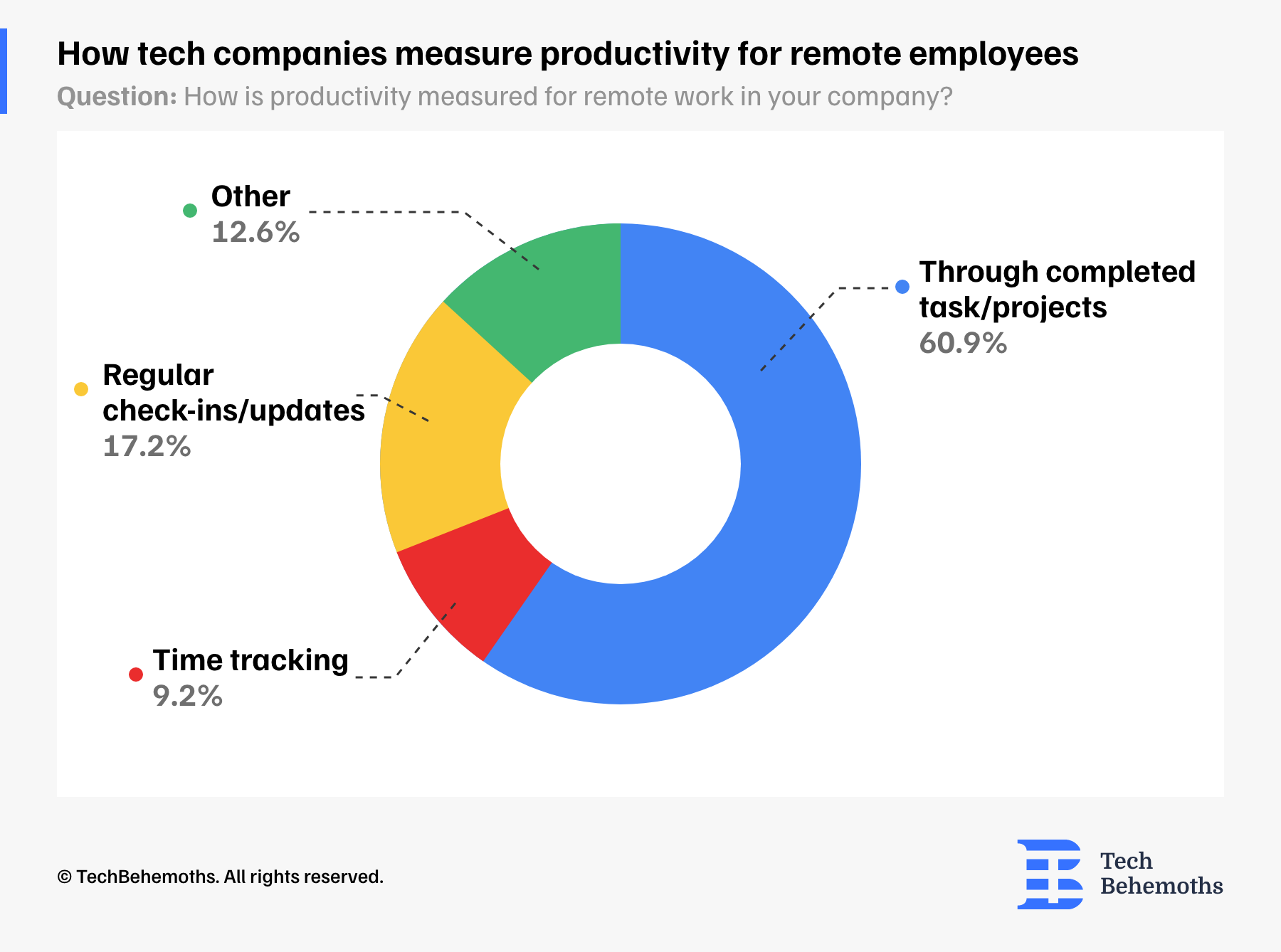
Impact of remote work on Companies’ expenses in the tech Industry
The survey question addressing the impact of remote work on company costs in the tech industry reveals noteworthy trends in cost savings. According to the data, 31.4% of companies reported significant savings as a result of implementing remote work. This substantial proportion underscores the financial benefits that remote work can bring, likely through reduced overhead costs such as office space, utilities, and in-office amenities.
41.9% of the respondents reported moderate savings, indicating significant but not dramatic cost reductions. This reflects the financial impact of remote work policies, showing the efficiencies gained from decreased physical office requirements and related expenses.
Additionally, 26.7% of companies reported no change in costs, suggesting that for some organizations, the financial benefits of remote work may be offset by other expenses, such as investments in technology infrastructure, remote work tools, and potentially higher utility costs for employees working from home.
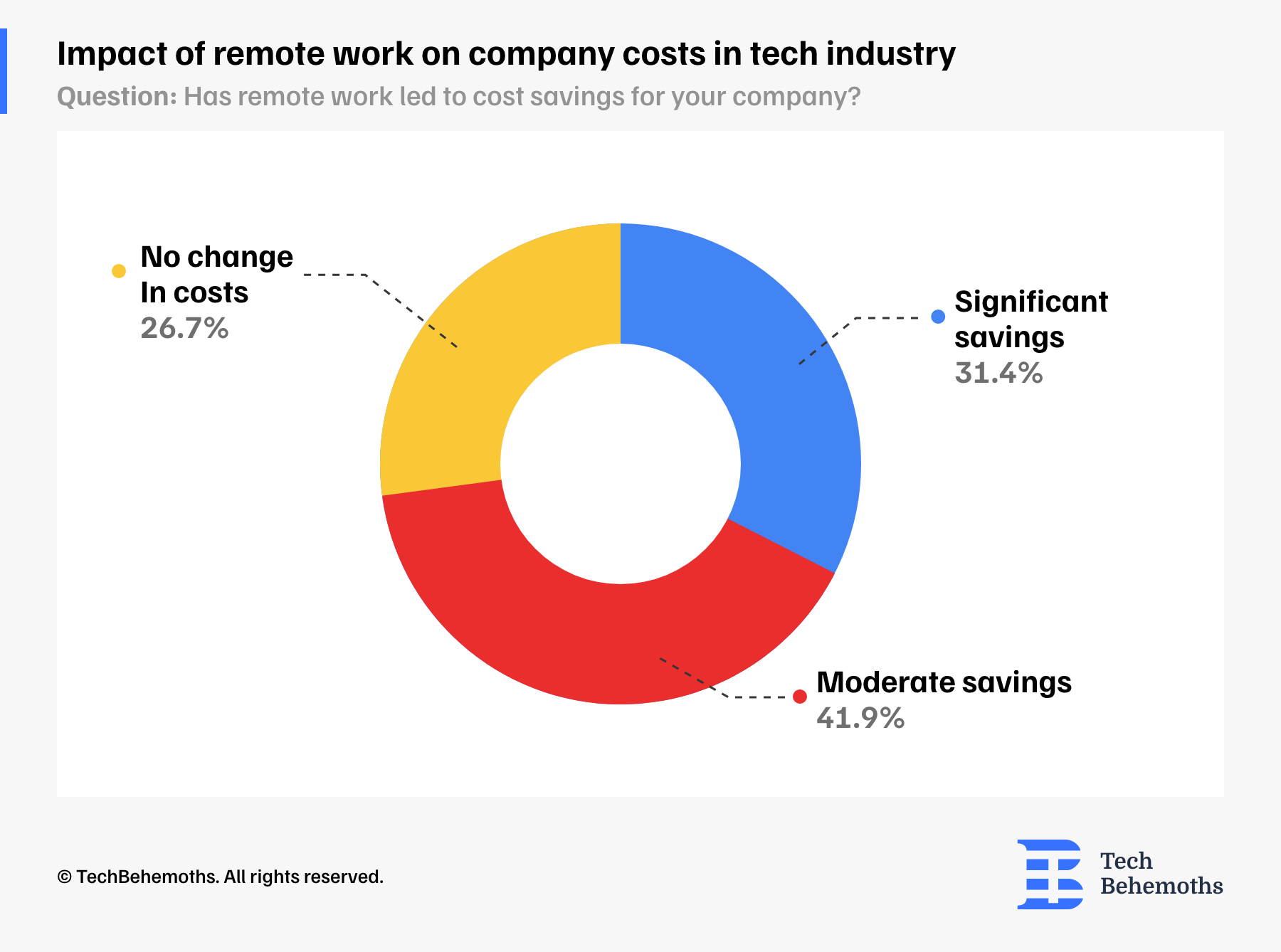
Expenses that increased due to remote work
The survey question on expenses that have increased or emerged due to remote work relates the following:
According to the results, 44.9% of respondents reported no increase in expenses, suggesting that nearly half of the companies did not encounter additional costs attributable to remote work. This indicates a smooth transition to remote work for many organizations, possibly due to pre-existing digital infrastructures or efficient cost management.
However, 41.6% of companies indicated an increase in technology and infrastructure expenses. This substantial percentage reflects the necessity for investing in robust digital tools, software, and hardware to support remote operations. Additionally, 30.3% of respondents highlighted further technology and infrastructure costs, underscoring the ongoing need for enhancements and updates to maintain effective remote work environments.
Security measures are another significant expense, with 27.6% of companies reporting increased spending in this area. The rise in cybersecurity investments underscores the importance of protecting sensitive data and ensuring secure communication channels in a remote work setting.
Training for remote work is another notable expense, identified by 25.4% of respondents. This suggests that companies are investing in upskilling their employees to adapt to remote work tools and practices, ensuring productivity and efficiency are maintained.
In the end, 13.7% of respondents mentioned other expenses, which may refer to a range of additional costs that may include remote work stipends, increased utility expenses for employees, or other miscellaneous expenditures related to the shift to remote work.
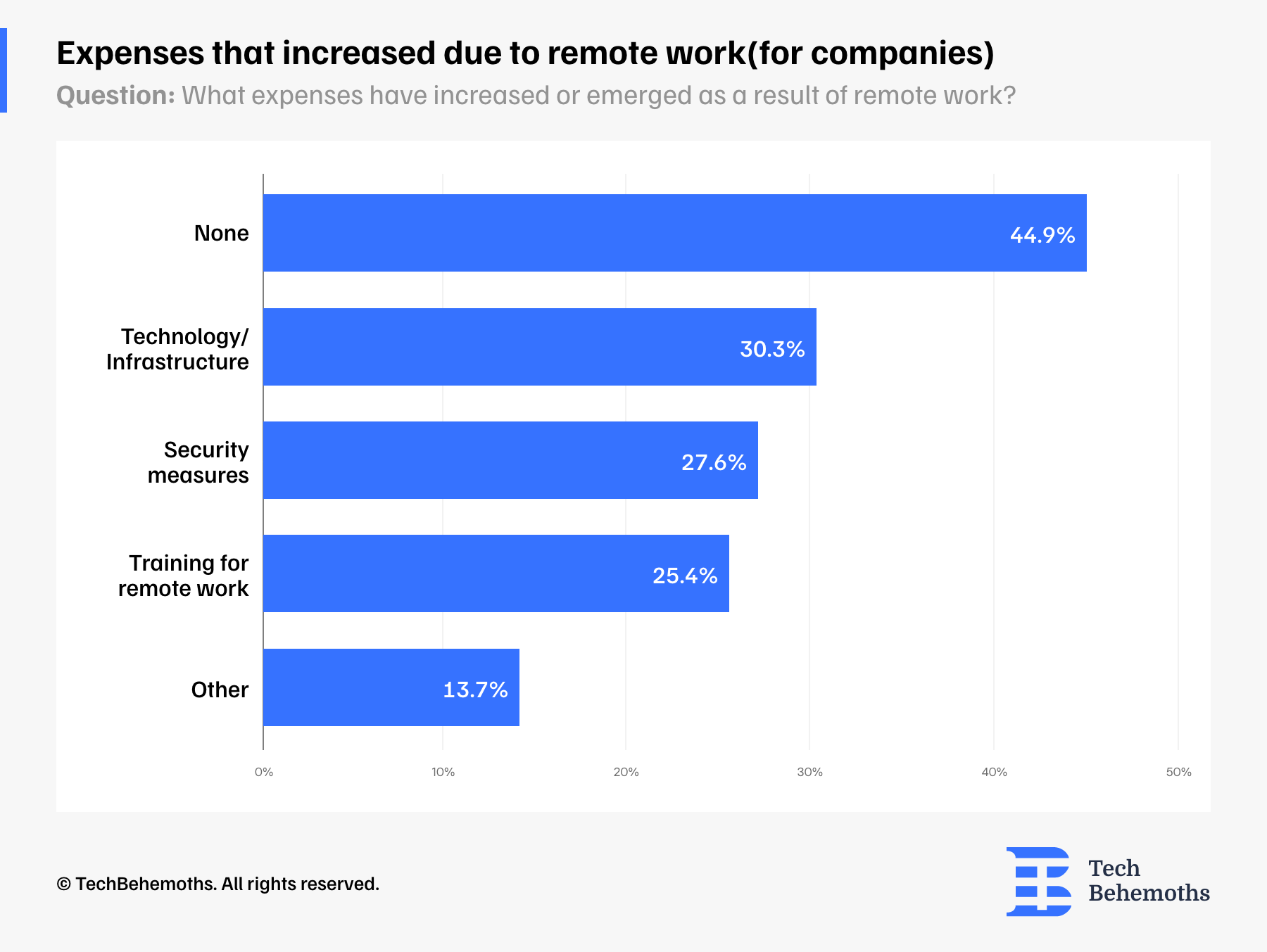
How are tech companies offering training for remote employees?
The survey question examining the share of tech companies currently offering training for remote work provides insights into how organizations are equipping their employees for effective remote operations. According to the data, 30.3% of companies offer training but only during the initial onboarding phase. This suggests that while there is an effort to prepare new hires for remote work, ongoing training might be lacking.
Regular training is provided by 29.2% of companies, indicating a commitment to continuous development and adaptation of remote work skills. This ongoing support likely helps employees stay updated with best practices and new tools, enhancing their remote work effectiveness over time.
Also,, another 29.2% of companies do not offer any training for remote work. This significant proportion points to a gap in support that could impact the productivity and satisfaction of remote employees, as they might not be adequately prepared or supported in their remote work environment.
A smaller segment, 9%, of companies do not currently offer training but are planning to implement it. This shows an awareness of the importance of such training and a future commitment to improving remote work capabilities.
In the end, 2.2% of respondents marked the option as not applicable, indicating either that their work setup does not require such training or they have other means of support in place.
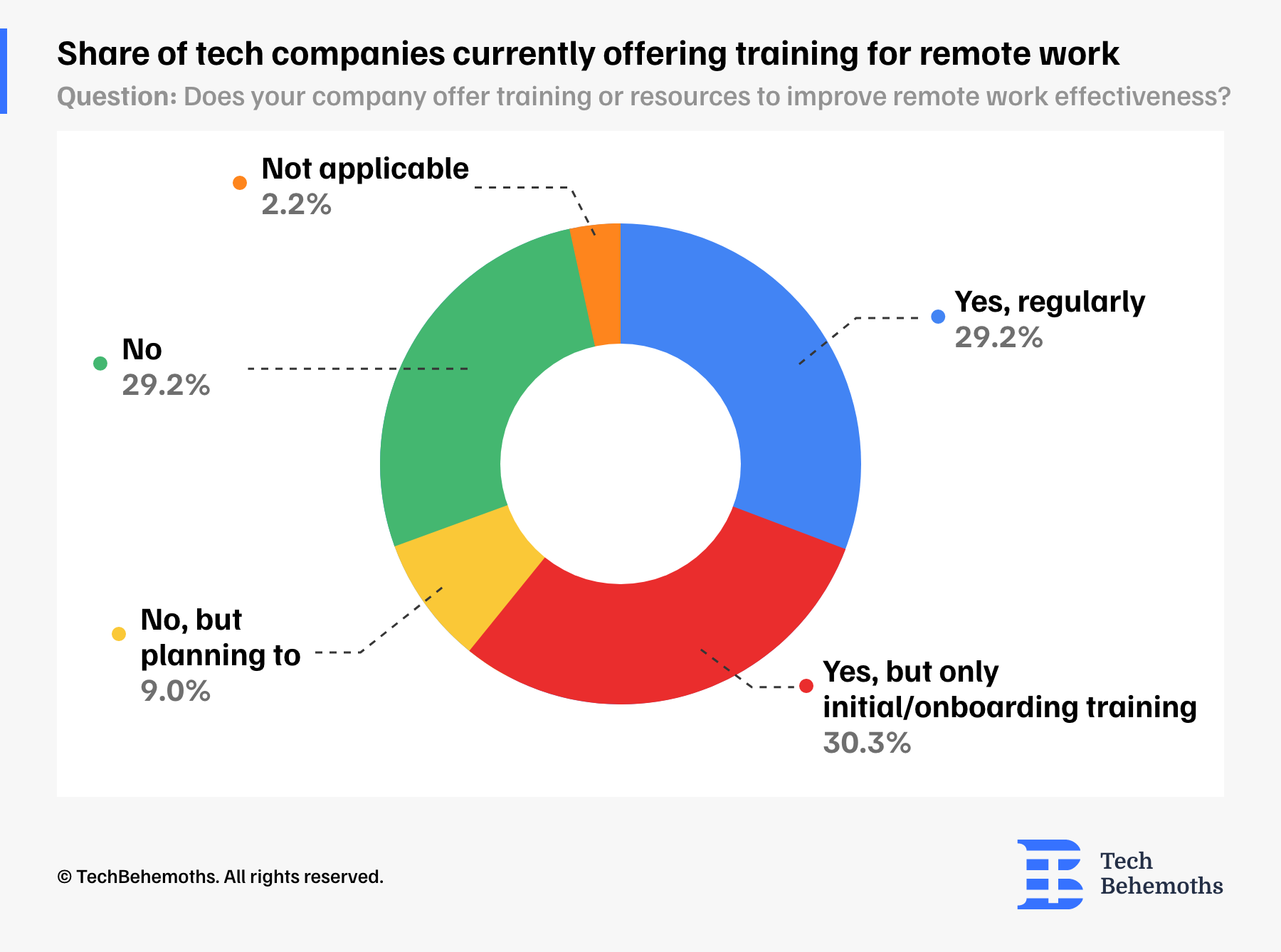
Remote work predictions and estimates in the tech industry - survey results
A significant 59.6% of respondents indicated that it is very likely their company will continue remote work. This overwhelming majority reflects a robust commitment to remote work, driven by the benefits and efficiencies companies have experienced.
Additionally, 25.8% of respondents believe it is somewhat likely that their companies will persist with remote work. This suggests that while there is strong support for remote work, there might be considerations or conditions that need to be addressed for its full continuation.
Also, only 5.6% of respondents think it is somewhat unlikely that remote work will continue, and a slightly higher 9% view it as very unlikely. These smaller percentages indicate a minority of companies that might be facing challenges or prefer traditional in-office operations.
Considering the survey results, and also the demographic aspect of this survey, we can say that there is a prevalent trend towards sustaining remote work in the tech industry. The significant majority predicting the continuation of remote work reflects the success and adaptability of remote work models. This trend is likely influenced by the positive impacts on productivity, cost savings, and employee satisfaction reported in previous survey results. The smaller percentages of companies hesitant to continue remote work highlight the need for addressing specific challenges or operational preferences that may hinder the full adoption of remote work practices.
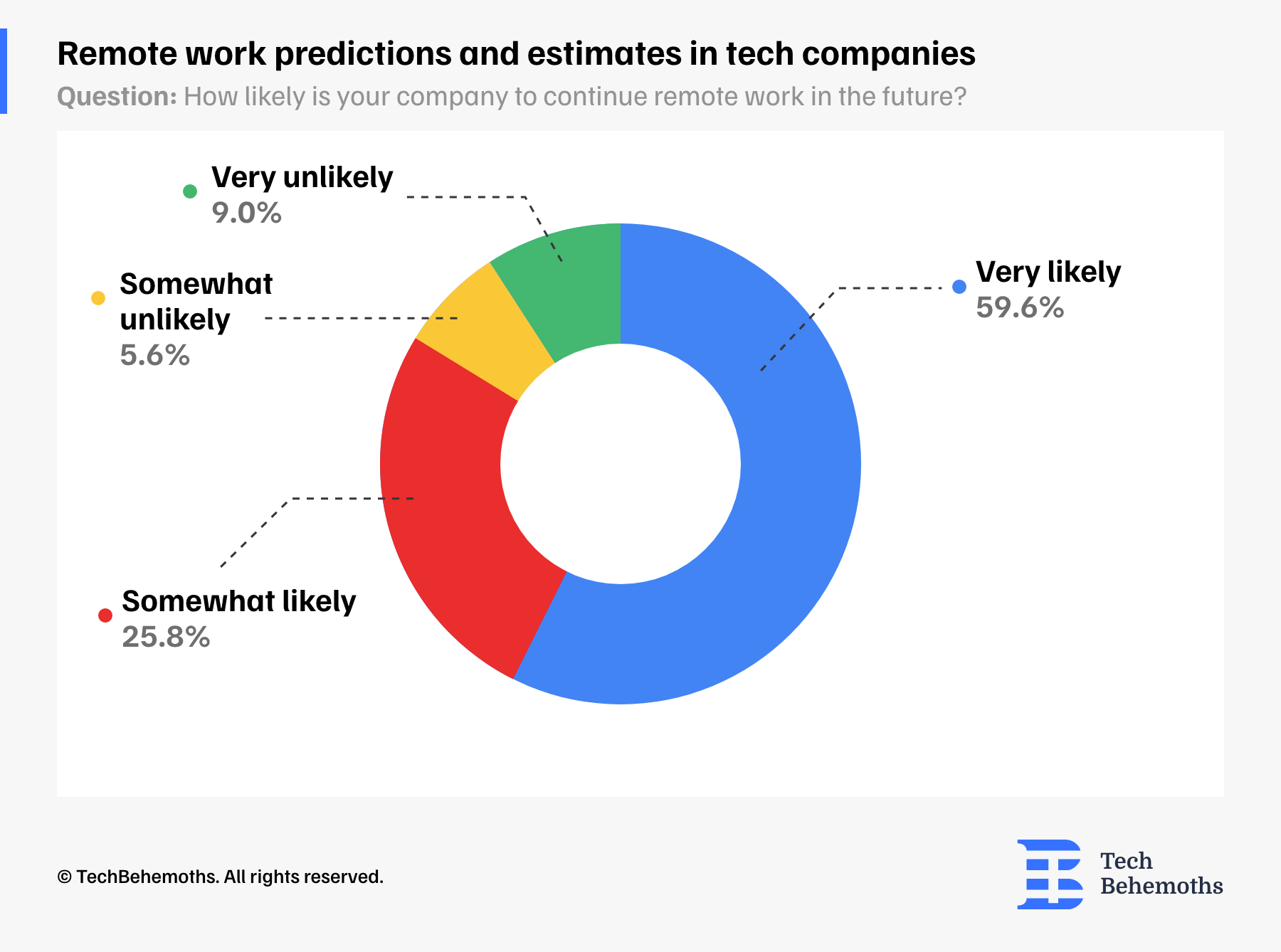
Partner Companies
The survey was conducted on a global scale and targeted IT companies and web agencies around the world. It was not limited to any specific geographical region or country, which resulted in responses from 332 companies located in 43 different countries. TechBehemoths is pleased to announce the list of partner companies who assisted in spreading the word and gathering responses for this survey.
-
2N Consulting Group, United States
-
2Stallions Digital Marketing Agency, Singapore
-
AFIVE Agency, United Kingdom
-
Alpha & Omega Computer & Network Services, Inc., United States
-
Ambient InfoTech, India
-
Ambient Infotech, India
-
AMG Digital Solution LLC, United States
-
AppWT LLC, Websites and More, United States
-
Aptagon Technologies, United Kingdom
-
Asheville NC Web Design, United States
-
Awata Technologies Limited, Nigeria
-
Bacancy Technology, India
-
BucksBus, United Arab Emirates
-
BugRaptors, United States
-
Candee, Greece
-
Cassiopea, Canada
-
CCSI Interactive, United States
-
Cdn, India
-
Codewave, India
-
Codezela Technologes Ltd, United Kingdom
-
Codment, United States
-
Cosmico Studios, United States
-
Create Ape, United States
-
Cubet Techno Labs, India
-
Cygnis Media, United States
-
Digital Dose, United Kingdom
-
Digitly, India
-
Doloctopus, Lebanon
-
Double Coconut, United States
-
DTC Infotech, India
-
Elysium Technology Solutions Ltd, United Kingdom
-
Encycdata, India
-
Exemplifi, United States
-
Falcon Solutions, India
-
Fusion Tech, United States
-
GoodWorkLabs, India
-
Grio, United States
-
HinjSocial, Pakistan
-
Holicky Corporation, United States
-
Ideas2IT Technologies Private Limited, United States
-
Imaginovation, United States
-
InStandart, United Kingdom
-
iRoid Solutions, India
-
IT Company, India
-
IT Services Provider, India
-
Level343 An International Marketing & SEO Company, United States
-
Matiyas Solutions LLP, India
-
Metawish AI Pvt Ltd, India
-
Mock ICT Solutions, Ethiopia
-
Moonstone Interactive, United States
-
New Perspective Marketing, United States
-
Newman Web Solutions Agency, United States
-
Newwave Solutions Japan, Japan
-
Newxel, Ukraine
-
Nick France Design, United States
-
Ortus Knights, United States
-
Panorama Press Marketing and Media, United States
-
Peiko, Ukraine
-
Phaedra Solutions, Pakistan
-
Piexxi Technology LLP, India
-
Postjer Group, United Kingdom
-
Prixite, United States
-
Real Wisconsin Website Design, United States
-
Redactia SEO, Romania
-
Rocket House Pictures, United States
-
Rohallion, United Kingdom
-
Sadja WebSolutions, Uganda
-
SinzeAD, Principat d’Andora
-
SMV Experts, United States
-
Square63, Pakistan
-
Squillion Technology, United Kingdom
-
Startbit IT Solutions Pvt. Ltd., United States
-
Ternate A & Associate Limited, Bangladesh
-
The Codest, United Kingdom
-
Thinkogic, India
-
Timspark, United Kingdom
-
uDIGIE, India
-
Vention, United States
-
WEZOM, United States